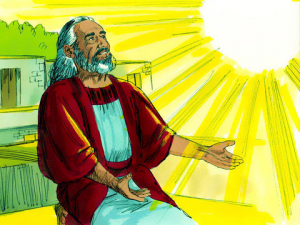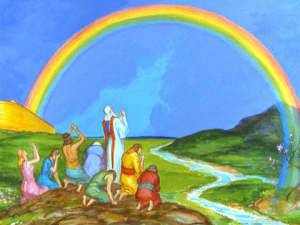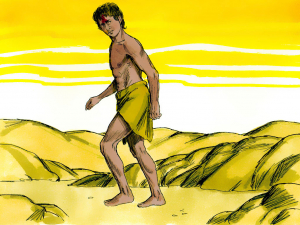Children’s Bible Program – Level 3: Lesson 13 “Israel Prepares to Meet God”
Author: Janth English
Read Together: God changed Jacob’s name to Israel. Israel’s descendants lived in Egypt and grew into a great nation. But the Egyptians enslaved them and put them to hard labor. God worked many miracles to free Israel from slavery. After the death of all the firstborn in Egypt, God led Israel out from Egypt under the leadership of Moses. They miraculously walked on dry land through the Red Sea, and God protected His people from the Egyptian army. God told Moses to bring the children of Israel to Him at Mt. Sinai after they left Egypt (Exodus 3:12). A few weeks after leaving Egypt, the children of Israel were encamped near Mt. Sinai, the mountain of God. God called Moses and told him to offer the people of Israel a special agreement, called a covenant. Israel would obey Him, and in return, He would make them His special people. The people agreed. God instructed the Israelites to clean up and wash their clothes, and “consecrate” themselves (which means to prepare themselves to meet with God). They were getting ready to meet their Creator!
Read Together: Exodus 1:1–14; 14:5–31; 19:1–11
Discuss:
- Explain that even though they had witnessed God’s miraculous interventions, Israel had not been obedient since leaving Egypt. They complained about the water and food (Exodus 15:22–25; 16:2–3). They broke the Sabbath (Exodus 16:26–29). And they complained against Moses (Exodus 17:2–3). Explain that experiencing miracles does not make it automatic that a person will respond by having faith in God. We still have to choose to obey and respond to Him.
- Ask your child why he or she thinks God told Israel to bathe and wash their clothes. What preparation would one make to visit the Queen of England? Use this as an opportunity to emphasize why we dress up for Sabbath services.
- Discuss what it means to be “consecrated,” which means “set apart for holy use.” Explain that the Church is the Israel of God and that we are set apart by God’s Holy Spirit. Help your child understand that if our parents (or parent) is baptized and in the Church, that means that we have a chance to have a relationship with God that we otherwise wouldn’t have (Acts 2:38–39, 1 Corinthians 7:14)
Review Memorization:
Exodus 20:1–17 The Ten Commandments (long form)






 Thankfully, God’s word tells us in advance of our ultimate destiny, so kingship hopefully won’t surprise us the way it surprised King Bhumibol. Even so, we probably will be surprised by how what we’re learning now, no matter how inconsequential it may seem, will end up being used by God to immense effect. Mr. McNair used the example of Joseph, who probably never thought for a second that his time as a slave and a prisoner would teach him skills he would later use to govern the nation of Egypt. But (spoilers!) that’s exactly what happened (Genesis 45:3-8). Mr. McNair advised us to look beyond what we see, to consider how what we’re learning right now might be used to unexpectedly shape our lives and the lives of others. As Mr. McNair said, “It’s always easy to think that the big, valuable stuff will be somewhere else, will be at another time, will be in another place…and to miss the goldmine in front of you.”
Thankfully, God’s word tells us in advance of our ultimate destiny, so kingship hopefully won’t surprise us the way it surprised King Bhumibol. Even so, we probably will be surprised by how what we’re learning now, no matter how inconsequential it may seem, will end up being used by God to immense effect. Mr. McNair used the example of Joseph, who probably never thought for a second that his time as a slave and a prisoner would teach him skills he would later use to govern the nation of Egypt. But (spoilers!) that’s exactly what happened (Genesis 45:3-8). Mr. McNair advised us to look beyond what we see, to consider how what we’re learning right now might be used to unexpectedly shape our lives and the lives of others. As Mr. McNair said, “It’s always easy to think that the big, valuable stuff will be somewhere else, will be at another time, will be in another place…and to miss the goldmine in front of you.”







